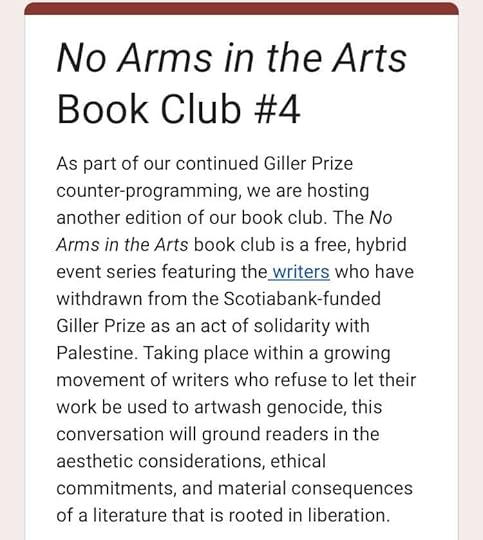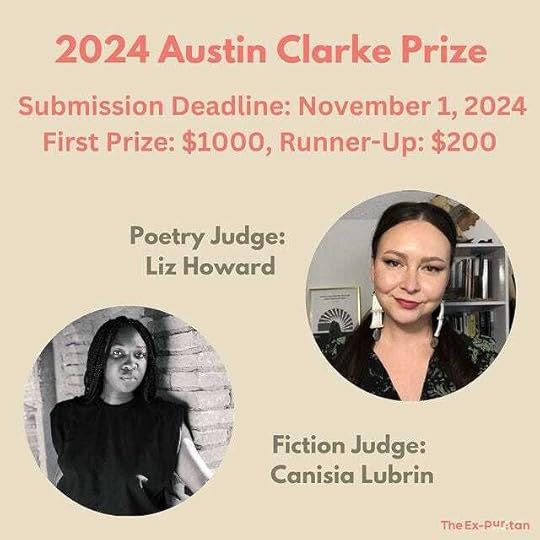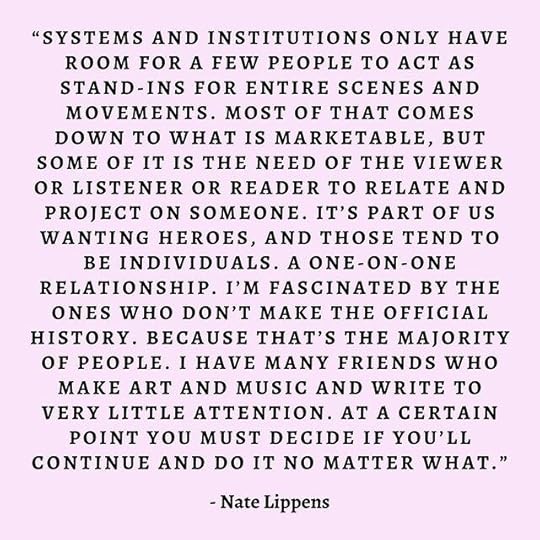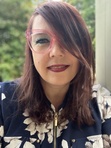Gatherings
No Arms in the Arts Toronto Event
Thursday, November 7th 2024, 6:00 pm - 8:00 pm ET, Toronto (venue TBD)
For our final edition before the Giller gala—and our first in-person event—2018 Giller shortlist and CanLit Responds organizer Thea Lim (An Ocean of Minutes) speaks with Farzana Doctor (The Beauty of Us), Spencer Gordon (A Horse at the Window), and several Toronto-based writers about their new releases and their commitment to withdrawing from the Giller Prize in solidarity with Palestine.

From the Draft Reading Series: An Archive of Care
November 22-24, 2024 | Entirely on Zoom.
What traces does care leave behind? Texts, images, scars, tears, belly-laughs, rituals, memories? For its 19th season, the Draft reading series has condensed our programming into a single weekend. Curators Kern Carter, Therese Estacion and Tyler Pennock have invited a stunning collection of authors to commemorate acts of care: giving and receiving, chosen or imposed, private, public or something in between.
A detailed version is available here.
To register, please use this form:
https://forms.gle/Fc8o9oXJZz2pf1HV7
Having trouble? Please contact us at draftreadings at gmail dot com
Calls for Submissionsex_puritan A post shared by @ex_puritanRecommended Reading
A post shared by @ex_puritanRecommended Reading“Some memories never heal. Rather than fading with the passage of time, those memories become the only things that are left behind when all else is abraded. The world darkens, like electric bulbs going out one by one. I am aware that I am not a safe person. Is it true that human beings are fundamentally cruel? Is the experience of cruelty the only thing we share as a species? Is the dignity that we cling to nothing but self-delusion, masking from ourselves this single truth: that each one of us is capable of being reduced to an insect, a ravening beast, a lump of meat? To be degraded, damaged, slaughtered–is this the essential fate of humankind, one which history has confirmed as inevitable?”
— Human Acts by Han Kang
Percival Everett, Sally Rooney, Viet Thanh Nguyen, Kaveh Akbar, Michelle Alexander, Naomi Klein, Téa Obreht, Peter Carey, Jericho Brown, Natalie Diaz, Mary Gaitskill, Hari Kunzru, Rachel Kushner, Jhumpa Lahiri, Justin Torres, Raven Leilani, Susan Abulhawa, Valeria Luiselli, Jia Tolentino, Ben Lerner, Jonathan Lethem, Hisham Matar, Maaza Mengiste, China Miéville, Torrey Peters, Max Porter, Miriam Toews, Leslie Jamison, Layli Long Soldier, and Ocean Vuong are among the hundreds of prominent authors who have signed an open letter pledging not to work with “Israeli cultural institutions that are complicit or have remained silent observers of the overwhelming oppression of Palestinians.”
Read Hundreds of Authors Pledge to Boycott Israeli Cultural Institutions by Dan Sheehan in LitHub
 Habiba’s SubstackThe silence of death is louder than all other sounds Between death and life, between fear and safety, between darkness and light. In our city, you can taste the taste of death in the alleys of the streets that have turned to ash. You know whenever you pass through the darkness of its alleys, you can smell the scent of death. We walk in the dark roads and empty streets and fear grips our hearts, whether we…Read more21 days ago · 15 likes · 5 comments · Quds Mon Amour
Habiba’s SubstackThe silence of death is louder than all other sounds Between death and life, between fear and safety, between darkness and light. In our city, you can taste the taste of death in the alleys of the streets that have turned to ash. You know whenever you pass through the darkness of its alleys, you can smell the scent of death. We walk in the dark roads and empty streets and fear grips our hearts, whether we…Read more21 days ago · 15 likes · 5 comments · Quds Mon AmourIt is with great sadness that we note the passing of Roy Miki, professor emeritus in Simon Fraser University's Department of English. Professor Clint Burnham offers an overview of Roy Miki’s life and career:
In Memoriam: Roy Miki, professor emeritus, SFU
Fire!! was a pathbreaking showcase for Black artists and writers “ready to emotionally serve a new day and a new generation.”
Read A Radical Black Magazine From the Harlem Renaissance Was Ahead of Its Time by Jon Key in Hammer & Hope
Bhakti Shringarpure Recommends Writing by Hammour Ziada, Leila Aboulela, Amir Tag Elsir, and More
Today, Sudan and its glittering capital, Khartoum, are under siege as conflicts simmering for decades have manifested into full-blown war. Hundreds of thousands of people have already been displaced, the death toll is increasing, the country’s rich resources are being plundered, and the damage to architecture and infrastructure has become unimaginable.
Read To Understand a Country: 8 Immersive Novels About Sudan in LitHub
This story began as a fairy tale.
I was nineteen, an aspiring writer myself, when I first read the fiction of Alice Munro. Fresh out of an MFA program in my mid-twenties, I moved to Victoria and stumbled upon a job at a bookstore co-founded by my literary idol. For the next nine years, as head of social media at Munro’s Books, I proudly advertised this connection (“Yes, that Alice,” the shop’s website boasted), happy to fill in the blanks of our icon’s elusive public persona with a fantasy of motherly sacrifice—for her bookselling days had coincided with the parenting of her young daughters, a time that predates the current Government Street location. Munro herself never worked in that building, a neoclassical marvel with lofty ceilings and a loftier origin story.
Read Undoing the Fairy Tale of Alice Munro by Justina Elias in The Walrus
Last year, I went to the doctor to get a referral for two long overdue hip replacements. The week leading up to my doctor’s visit, I tried not to eat up all the sugar in the house. I prayed a lot. I assumed the worst. And the worst, at that point, was that this doctor, all the way up in New York, would tell me I had an incurable disease and I was going to die.
Read Letter from Home by Kiese Layman in The Bitter Southerner [Thanks to Carriane Leung for sharing this essay.]
New research reveals that people who are experiencing climate-related distress are more likely to engage in collective action. History, by contrast, shows that manufactured optimism can lead to complacency and the shirking of responsibilities.
In the 1990s, hope – coupled with doubt – was the fossil fuel industry’s antidote to the precautionary principle, the sensible idea that some problems had such dire implications that humanity should err on the side of caution even if the science was not completely settled. When George Bush was president, he was initially so concerned by the impact of fossil fuels on the climate that he looked into regulating the oil industry. But he backed away from this on the grounds that future generations would probably develop new technologies to solve the problem. Call that dumb, call that wishful thinking, or call that hope, the result was the same: no action.
Read Would abandoning false hope help us to tackle the climate crisis? by Jonathan Watts in the Guardian
On notetaking!
 sweater weatherhow i'm taking notes (for now)Hello friends…Read more8 days ago · 108 likes · 22 comments · BrandonFeud(al)Codawe scum the fluid-slick world pebble, are 70% water, are an empire of aqueducts; we—extinguishing ourselves soon enough —know the fluttering formations of jacaranda seeds can find quiet only in the hollow we are becoming © Tolu Oloruntoba…Read more18 days ago · 3 likes · 2 comments · Tolu Oloruntoba
sweater weatherhow i'm taking notes (for now)Hello friends…Read more8 days ago · 108 likes · 22 comments · BrandonFeud(al)Codawe scum the fluid-slick world pebble, are 70% water, are an empire of aqueducts; we—extinguishing ourselves soon enough —know the fluttering formations of jacaranda seeds can find quiet only in the hollow we are becoming © Tolu Oloruntoba…Read more18 days ago · 3 likes · 2 comments · Tolu OloruntobaRead ’s “Coda”
Many of us who have spoken out against Israel’s war on Gaza have not only opposed the war, but also drawn connections between the violence there and other interlocking crises: mass death and displacement in Sudan, the Congo and Haiti; the disparity between U.S. military funding for war and funding for escalating climate catastrophes; the expansion of carceral systems, including surveillance and militarization of policing; and the increased criminalization of dissent following the racial justice protests in 2020, quelling connections between the global and the domestic. Suppression of dissent also suppresses connections between people and communities in a time of organized abandonment, a time when we need each other even more.
Read Literary Institutions Are Pressuring Authors to Remain Silent About Gaza by Lisa Ko in truthout
 Writing for People Who Hate WritingWrite Because You Want To“I have dreamed…Read more19 days ago · Jessica Johnson
Writing for People Who Hate WritingWrite Because You Want To“I have dreamed…Read more19 days ago · Jessica JohnsonRead Write Because You Want To by Jessica Johnson
jacob_wren_writer A post shared by @jacob_wren_writer
A post shared by @jacob_wren_writerFrom A Queen Without a Country: Nate Lippens, Interview in Full Stop
Recommended ViewingNight of the Living Dead (1968)
PodcastsSupport Send My Love to AnyoneSupport Send My Love to Anyone by signing up for a monthly or yearly subscription, liking this post, or sharing it!
Big heartfelt thanks to all of the subscribers and contributors who make this project possible!
ConnectBluesky | Instagram | Archive | Contributors | Subscribe | About SMLTA



